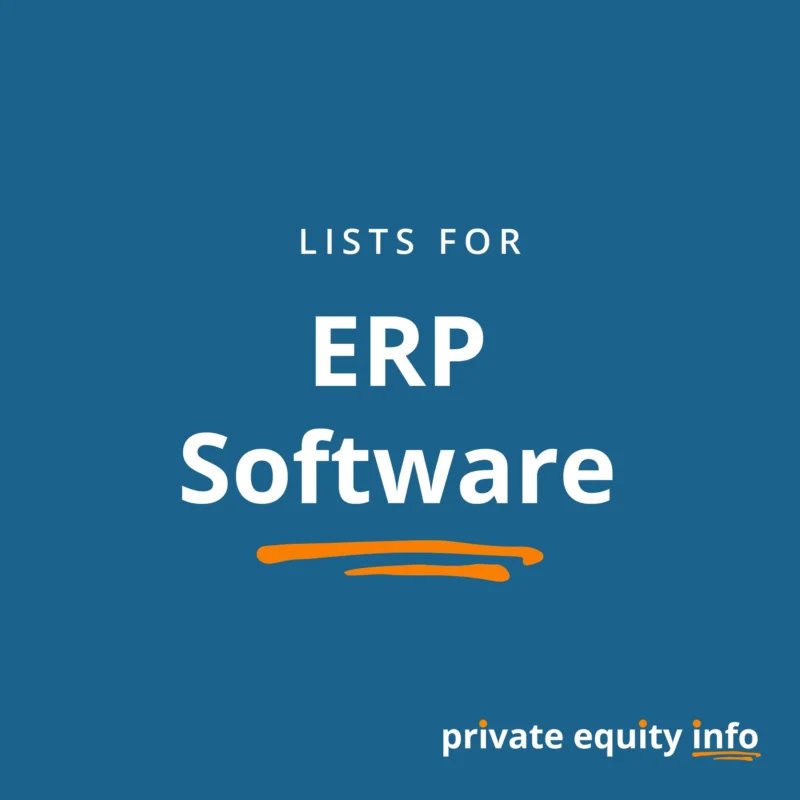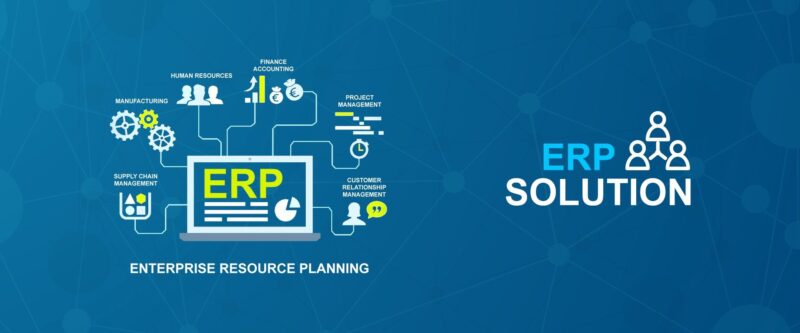In the fast-paced realm of private equity, outpacing the competition is vital. Private equity ERP software plays a key role in achieving this. But what exactly is private equity ERP software? Why is it crucial in the industry? What benefits does it offer? Discover the answers in this article as we explore the significance of Private Equity ERP Software and how it can revolutionize your operations.
TOC
- 1. Private Equity ERP Software: A Complete Solution for Private Equity Firms
- 2. Features of Private Equity ERP Software
- 3. Key Considerations for Selecting Private Equity ERP Software
- 4. Top Private Equity ERP Software in the Market
- 5. Implementation and Integration of Private Equity ERP Software
- 6. Conclusion

Private Equity ERP Software: A Complete Solution for Private Equity Firms
Private Equity ERP Software is a specialized solution tailored to streamline operations, boost efficiency, and foster growth within private equity firms. This comprehensive software consolidates functions and data, offering a centralized hub for financial insights, portfolio management, deal tracking, reporting, and investor relations.
Why Private Equity ERP Software Is Crucial in the Industry
In the competitive realm of private equity, a robust software solution is no longer a luxury but a necessity. Private Equity ERP Software allows firms to automate tasks, streamline decision-making processes, and gain real-time investment insights. It empowers professionals to focus on strategic initiatives, deal sourcing, and value creation, reducing manual workloads and data fragmentation.

Advantages of Private Equity ERP Software
Private Equity ERP Software provides numerous benefits that can significantly improve firm performance and profitability. By utilizing this software, you can:
- Boost Operational Efficiency: Simplify workflows, automate tasks, and reduce operational costs through streamlined processes.
- Access Real-time Data: Make informed decisions with up-to-date financial, investment, and performance information.
- Enhance Investor Relations: Foster trust with investors through secure portals for reports and investment tracking.
- Ensure Compliance: Stay current with regulations and standards to uphold a strong reputation.
- Drive Portfolio Growth: Optimize investments, monitor performance, and identify trends to maximize returns.
Private Equity ERP Software is a transformative tool that empowers firms to excel in a dynamic industry. Explore the upcoming section for a detailed look at the key features that make Private Equity ERP Software essential for success.
Features of Private Equity ERP Software
Private Equity ERP Software provides a comprehensive array of functionalities tailored to meet the distinct requirements of private equity firms. Let us delve into the key features that render this software an indispensable asset for enhancing operational efficiency and fostering growth.
Financial Management
Robust financial management serves as the cornerstone of every prosperous private equity firm. Private Equity ERP Software encompasses advanced financial modules that empower firms to automate fundamental accounting procedures, oversee cash flows, monitor expenditures, and generate detailed financial statements. Through real-time financial insights, strategic decisions can be made to optimize financial performance effectively.
Portfolio Management
The meticulous oversight and analysis of a diverse investment portfolio are imperative. Private Equity ERP Software equips firms with portfolio management tools to monitor investments, assess performance, and analyze risks spanning various asset categories. Leveraging user-friendly dashboards and customizable reports, profound insights into portfolio performance can be obtained to facilitate informed investment strategies and proactive risk management.
Deal Management
Efficient deal management is crucial for private equity firms to identify, evaluate, and execute investment prospects. Private Equity ERP Software incorporates deal management functionalities that streamline the deal pipeline, automate due diligence procedures, and promote collaboration among deal teams. By centralizing deal information and document handling, the software accelerates deal execution, minimizes manual inaccuracies, and enhances deal monitoring.
Private equity firms depend on accurate reporting and analytics to engage with investors, stakeholders, and regulatory bodies effectively. Private Equity ERP Software offers robust tools for generating comprehensive reports, tracking key performance indicators, and evaluating investment performance. With customizable dashboards and advanced analytics, gain valuable insights to track trends and drive data-driven decisions.
Nurturing strong investor relationships is key for private equity firms. Private Equity ERP Software provides investor relations features that create secure, self-service portals for investors to access reports, monitor investments, and facilitate seamless communication. By enhancing transparency and empowering investors, you can enhance relationships, build trust, and attract new investors.
Adhering to industry regulations and reporting standards is vital for private equity firms. Private Equity ERP Software ensures compliance and regulatory support, automating processes to generate accurate regulatory reports and mitigate compliance risks. By upholding a solid reputation, you can inspire confidence in investors and stakeholders.
Private Equity ERP Software integrates these essential features to deliver a comprehensive solution tailored to the distinct requirements of private equity firms. In the following section, we’ll explore the key factors to consider when selecting the ideal Private Equity ERP Software for your firm.
Key Considerations for Selecting Private Equity ERP Software

When choosing Private Equity ERP Software for your firm, it’s vital to thoroughly assess a range of factors to ensure the right decision. Let’s delve into essential considerations to keep in mind:
Scalability and Customization
To align with your firm’s growth, your software should scale accordingly. Seek a solution that offers scalability to manage rising data volumes and expanding portfolios. Additionally, prioritize customization options tailored to your firm’s unique operational needs.
Integration Capabilities
Seamless integration with existing systems is fundamental for efficient workflows. Confirm that the chosen Private Equity ERP Software can integrate smoothly with crucial tools like accounting software, CRM systems, and data providers. This integration streamlines data synchronization, reducing manual entry and error risks.
User-Friendly Interface
User experience significantly influences software adoption success. An intuitive interface empowers your team to navigate and utilize the software effortlessly, minimizing the need for extensive training. Look for a solution with clear workflows, intuitive navigation, and customizable dashboards to boost user efficiency.
Security Protocols
Data security stands as a critical priority within the private equity sector, given the sensitivity of the information at hand. It is imperative to select software that offers robust security measures, including encryption, access controls, and regular security updates. Moreover, delve into data backup and disaster recovery strategies to uphold the integrity of your valuable data.
Vendor Credibility and Support
Opting for a reputable vendor is imperative to ensure seamless implementation and continuous support. Delve into the vendor’s reputation, industry expertise, and client feedback. Assess their customer service provisions, responsiveness, and availability for assistance. A dependable vendor will serve as a reliable ally throughout your software journey, delivering consistent support and updates.
By conducting a thorough assessment of these elements, you can strategically choose a Private Equity ERP Software that meets your firm’s distinct needs. In the subsequent section, we will delve into the premier Private Equity ERP Software solutions on the market, aiding you in refining your selection.
Top Private Equity ERP Software in the Market

Private equity firms typically avoid using traditional ERP software tailored for manufacturing or general business operations. Their requirements are more specialized, focusing on managing investments, portfolio companies, and investor relations. Below are software solutions commonly preferred by private equity firms instead of traditional ERP software:
- iLEVEL
- AltExchange
- Burgiss
Private Equity Software (PES): CloudStreet
Investor Relations Software (IR Software): This software aids in managing investor communication, report and presentation distribution, and tracking investor activity. Noteworthy examples include:
- DealCloud
- Veeva Vault Investor Relations
- Torrey
Document Management and Due Diligence Software: These platforms facilitate secure document sharing, collaboration, and communication during investment processes. Key examples include:
- Datasite
- Merrill Datasite
- VDR (Virtual Data Room) solutions provided by companies like Intralinks and Box
CRM (Customer Relationship Management) Software: While not exclusive to PE firms, CRM software can be beneficial for maintaining relationships with potential and existing investors and portfolio companies. Reputable examples include:
- Salesforce
- Zoho CRM
- HubSpot CRM
Selecting the most suitable software for a private equity firm hinges on the firm’s size, investment strategy, and specific requirements. It is advisable to conduct thorough research and compare features, pricing, and user reviews before finalizing a decision.
Implementation and Integration of Private Equity ERP Software

Efficiently implementing Private Equity ERP Software demands meticulous planning and smooth integration for a successful transition. Let’s delve into the essential steps within this process:
Planning and Preparation
Prior to initiating the implementation of Private Equity ERP Software, it is imperative to establish precise objectives and delineate the project’s scope. This necessitates evaluating the specific requirements of your firm, conducting a comprehensive analysis of existing systems and processes, and defining desired outcomes. Collaborate with key stakeholders to craft a meticulous implementation plan encompassing timelines, resource allocation, and milestones.
Data Migration
A pivotal phase involves migrating data from legacy systems to the new ERP software. Ensuring data accuracy and integrity during this stage is crucial. Identify the data for migration, cleanse and organize it, and establish data mapping to align with the structure of the new system. Engage with the software vendor to determine an efficient data migration strategy, considering factors like data volume, complexity, and security.
Training and Support
Comprehensive training is imperative to optimize the advantages of Private Equity ERP Software. Ensure your team undergoes thorough training on the software’s functionalities, workflows, and best practices. The software vendor should provide training materials, user guides, and continuous support to address queries or challenges that may arise during implementation. Foster smooth transition by promoting open communication and feedback channels.
Testing and Deployment
Prior to the complete deployment of Private Equity ERP Software, conducting rigorous testing is vital to ensure stability, functionality, and compatibility. Develop test scenarios and execute meticulous testing to identify and rectify any potential issues or bugs. Upon successful completion of testing, proceed with deployment as per the implementation plan. Monitor the system vigilantly during the initial phase to promptly resolve any unforeseen issues.
Successfully integrating and implementing Private Equity ERP Software necessitates meticulous planning, data migration, comprehensive training, and thorough testing. Adhering to these steps ensures a seamless transition and allows you to harness the software’s full potential. Subsequently, we will delve into the top Private Equity ERP Software solutions available in the market.
Conclusion

In conclusion, Private Equity ERP Software is reshaping the private equity sector by offering holistic solutions to boost operational efficiency, foster growth, and enhance investor relations. Its capacity to streamline processes, provide real-time insights, ensure regulatory adherence, and optimize portfolio performance positions Private Equity ERP Software as a pivotal asset for firms aiming to thrive in today’s dynamic landscape.
By harnessing the capabilities of Private Equity ERP Software, private equity entities can automate manual operations, eradicate data fragmentation, and make informed decisions confidently. The advantages span from heightened productivity and reduced operational expenditures to cultivating robust investor connections and maximizing investment returns.
When selecting the suitable Private Equity ERP Software for your firm, it is imperative to assess factors like scalability, customization features, integration capabilities, user-friendly interfaces, security protocols, and vendor credibility. You require a solution that not only fulfills your existing requirements but also possesses the adaptability to evolve alongside your firm’s growth.
At erp.petfoodreviews.com, we acknowledge the distinct hurdles encountered by private equity firms, and our Private Equity ERP Software is crafted to confront these challenges directly. Backed by a range of comprehensive features, unwavering support, and a commitment to innovation, we are devoted to empowering you to unleash your firm’s full potential.
